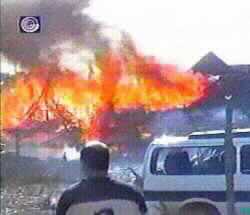- Author:
& News Agencies - Section:
WORLD HEADLINES
- Hajj & Umra WORLD HEADLINES
Kenya Sees No Al Qaeda Link So Far with Detainees

Kenya said on Saturday it had so far found no link between 12 people held over Thursday's attacks on Israelis in Mombasa and the al Qaeda network that some suspect was behind them, and two detainees were freed. U.S. officials said on Friday the top suspect for the blast at the Israeli-owned Paradise Hotel in which 15 people including three attackers were killed was the Somali-based group Al-Itihad al-Islamiya, known also as AIAI or the Islamic Union.
They said it was a prominent resistance Islamist group in the Horn of Africa and had links with Osama bin Laden's al Qaeda, target of President Bush's war on terror after the September 11 attacks on New York and Washington last year.
But Kenyan Internal Security Minister Julius Sunkuli, asked if police had found any connection between al Qaeda and those being held over the explosion and a failed simultaneous attempt to shoot down an Israeli airliner, said: "None so far."
Sunkuli told a news conference that of the 12 detainees, all foreigners, a U.S. and a Spanish national "appear to have the least connection" to the attacks.
Authorities later freed the two after questioning. "They were released," William Langat, a senior police officer involved in the investigation into the attacks, told Reuters.
The American and Spaniard were held after trying to check out of another hotel in the area about two hours after the blast.
The other detainees are six Pakistanis and four Somalis. They were arrested for entering Kenya illegally and only later came under suspicion by investigators probing the attacks, police said.
AUSTRALIAN WARNING
Friday's U.S. comments were the first from Washington to point a finger at al Qaeda and the Somali group since suicide bombers rammed an explosives-laden vehicle into the seaside hotel and missiles nearly hit an Israeli airliner carrying 261 people.
But U.S. officials stressed it was too early to be sure about who was responsible.
"The pattern could fit al Qaeda," said one official. Security analysts said the apparently coordinated attacks just minutes apart bore the hallmarks of bin Laden's network.
Al Qaeda is widely accused of the 1998 bombings of U.S. embassies in Kenya and Tanzania in which 224 people died, most of them Africans.
The previously unheard of "Army of Palestine" claimed responsibility for Thursday's attacks in a faxed statement via a Lebanese media organization. There was no confirmation.
Near the Kenyan coastal city of Mombasa, Israeli and U.S. experts scoured the debris of the hotel and the wreckage of the suicide bombers' four-wheel drive Pajero.
British Foreign Secretary Jack Straw said on Friday no intelligence was available to the West that could have prevented the attacks, suggesting that an Australian warning two weeks ago of a possible terrorism risk in Kenya was not specific enough.
Sunkuli, asked whether he had received a warning from Australia, said: "I am saying I'm not the only person who ought to have that information, but I am saying, I don't have that information."
Britain and the United States warned their citizens on Friday of possible heightened risks in Kenya, particularly in public places frequented by foreigners.
Three suicide bombers smashed the Pajero into the lobby of the Paradise Hotel and blew it up, killing 12 people -- three of them Israelis -- and wounding scores. Minutes earlier missiles were fired at the Israeli plane taking off nearby and packed with Israeli tourists.
Other victims included Kenyan dancers who had been welcoming tourists in the hotel lobby when the bomb went off.
KENYAN MUSLIMS CONDEMN ATTACKS
Mombasa is a mostly Muslim city with links to the Arab world.
The Supreme Council of Kenya Muslims (SUPKEM), an umbrella organization of Kenyan Muslims, condemned the attacks and said those behind them were enemies of Islam and Muslims in Kenya.
"We would like to assure our enemies that Muslims in Kenya will continue to co-exist with other fellow Kenyans of other faiths as they have always done," SUPKEM Chairman Abdughafur El-Busaidy was quoted as saying in the East African Standard.
Israeli survivors were flown home to tearful reunions in an Israeli air force plane, which also took back the bodies of the three Israelis killed, two brothers aged 13 and 15, and a 61-year-old man.
Relatives of the dead dancers have accused Israel of failing to help African families devastated by the hotel bombing.
"They are only talking about the dead Israelis. What about my husband, my family?," said Asha Abudu, 36, a mother of eight children who lost her husband in the blast.
PHOTO CAPTION
A man observes the blaze outside the Paradise Hotel in Kikambala, Kenya, in this amateur video image showing the immediate aftermath of Thursday's bomb attack, made available on Friday, Nov. 29, 2002. (AP Photo/APTN/IBA)
Related Articles
 Hajj virtues
Hajj virtues
-
School of Faith in Ten Days of Thul-Hijjah
The believing human self needs strong provocations in order to awaken whenever it is enveloped by laziness in...
-
The Status of Hajj in Islam
Hajj is the fifth pillar of Islam; Allah, The Exalted, ordained it in the ninth year after Hijrah (the Prophet's,...
-
School of Faith in Ten Days of Thul-Hijjah
The believing human self needs strong provocations in order to awaken whenever it is enveloped by laziness in relation...


 Home
Home Discover Islam
Discover Islam Quran Recitations
Quran Recitations Lectures
Lectures
 Fatwa
Fatwa Articles
Articles Fiqh
Fiqh E-Books
E-Books Boys & Girls
Boys & Girls  Hajj Rulings
Hajj Rulings Hajj Fatwas
Hajj Fatwas












